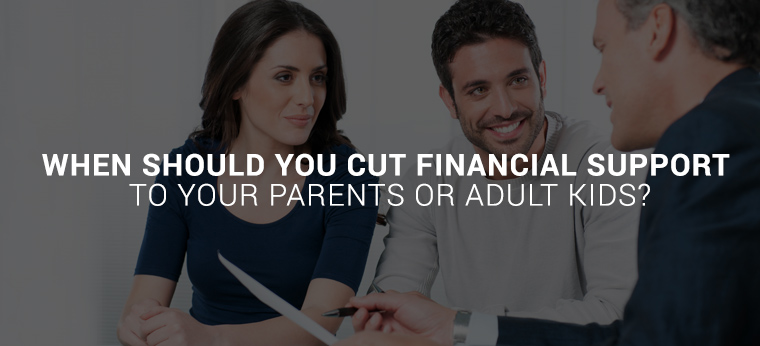
There are a few things fundamentally understood when offering financial support to family members, usually an adult child or an aging parent. The first is that we want to do it. The second is that we expect them to find their footing in the near future. Lastly, it is well understood that constantly bailing them out of trouble and being a crutch will only cause them to fall into a state of co-dependency and reliance.
Yet, Time Magazine suggests that 25% are currently caring for an adult child or an aging parent in the home. This is in the United States, but the numbers are hardly better in Canada where the Great Recession impacted the country in a less direct manner.
Draw the line on financial support
Where is the line between co-dependency financial support and “just trying to help?” There is no universal time frame because everyone has a different idea of what is too long. It also cannot be the factor of getting a full-time job because the job market is insufferably poor, and it could take years to find a good job. Below are three quick suggestions that could help find where that line is:
- Is the adult child actively applying for work, or has a part-time job? If so, perhaps a parent can stop paying for household items to encourage some self-reliance. Do not buy all the groceries or clean their room. They should be able to handle that just fine.
- Is a parent sickly? That could go a long way in extending care time. Try to encourage an open discussion with a doctor (and the parent, of course) in pursuit of more self-reliance from an aging parent on hard times.
- Are drugs involved? If so, do not be an enabler. This tie must be cut sooner than later. It is incredibly easy to say, but parents are doing their child no favors by shielding them from a reality they are dovetailing towards. There may be a period of complete mystery and fear, but it needs to be done. Speak to a professional financier such as argent direct, or a therapist.
Financial support is a thing of guts feeling
When it comes down to it, a lot of it has to do with a gut instinct. Do you feel taken advantage of? Is there a sense that the adult child is simply not doing everything they realistically can to get ahead? Consider that adult children have decades to bounce back from a situation, and holding them back from making the necessary dive into adulthood will only promote an immature understanding of finances and self-dependence.
